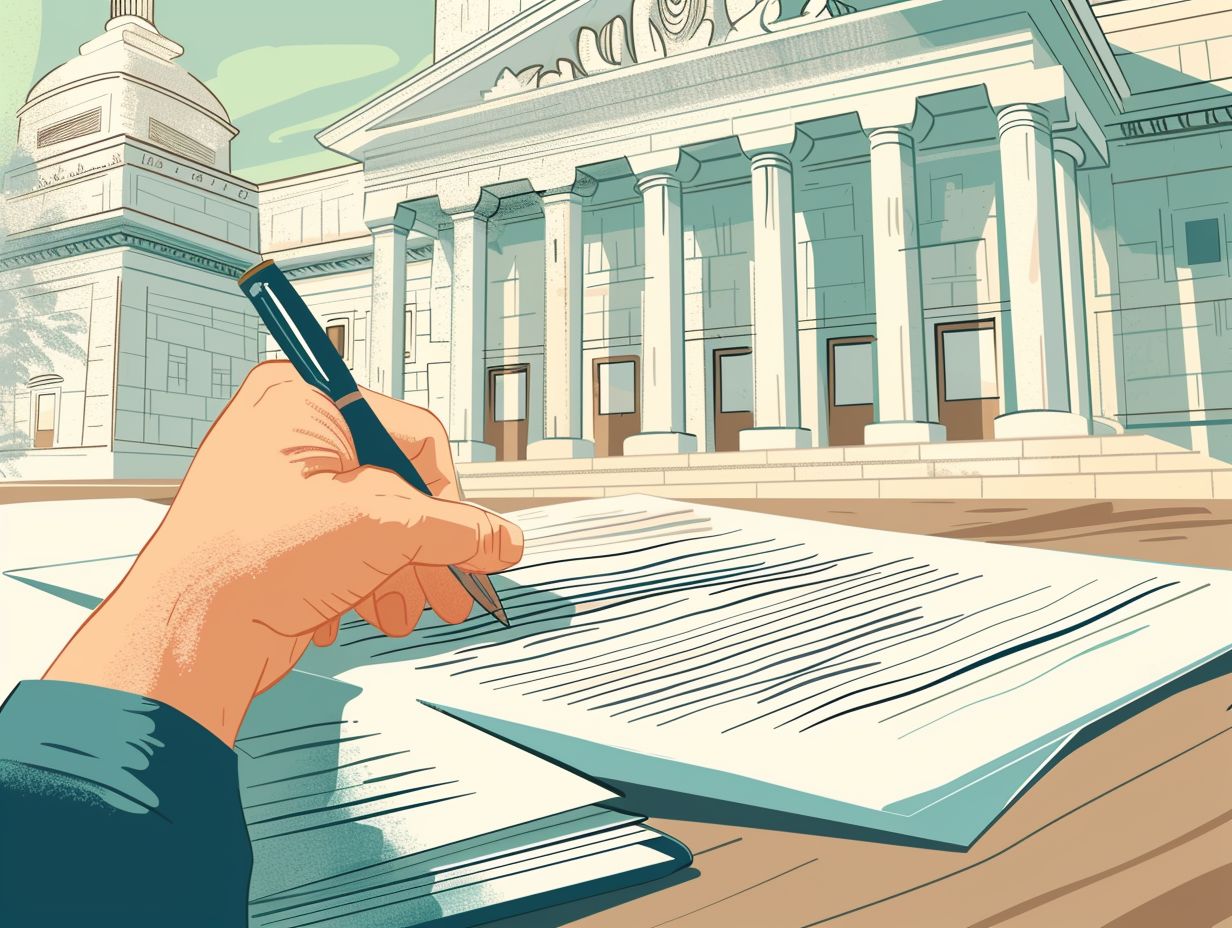If you or a loved one finds themselves in a situation where bail is necessary in Florida, navigating the process can feel overwhelming. From contacting a bail bondsman to attending court appearances, there are specific steps to follow. But what happens if bail is unaffordable?
This article will guide you through the steps of obtaining bail in Florida, as well as what to do if you cannot afford it. We will explore the consequences of failing to appear in court.
Key Takeaways:

- Contact a bail bondsman for assistance in obtaining bail in Florida.
- In case you cannot afford bail, seek a bail reduction hearing or assistance from a bail bond agency or consider a pretrial release program.
- Failure to appear in court may result in forfeiture of bail, arrest warrant, or revocation of bail. Attend all court appearances as required.
How to Get Bail in Florida?
Obtaining a bail bond in Florida requires knowledge of the bail process, which permits a defendant to be released from custody pending their court appearances. This procedure is carried out by a bail bondsman, and the bail amount is calculated considering various factors, such as the defendant’s charges and criminal background.
1. Contact a Bail Bondsman
The initial step in obtaining a bail bond is to promptly reach out to a respected bail bondsman, such as Mike Snapp Bail Bonds in Orlando, FL, following the arrest of the defendant.
This initial interaction with a bail bondsman is vital as they serve a crucial role in aiding individuals through the intricate bail process. Bail bondsmen, like those at Mike Snapp Bail Bonds, help clients comprehend the legal requirements and financial commitments linked with obtaining a bail bond.
They work diligently to speed up the release of the defendant by posting the required bail amount. As a professional service, Mike Snapp Bail Bonds in Orlando, FL, provides 24/7 support, ensuring that individuals have assistance available at any time of day or night.
2. Gather Necessary Information
For move forward with the bail bond process, it is important to collect all necessary information, which includes details about the defendant’s charges, the bond amount, and any required paperwork. This step is crucial as it establishes the groundwork for a seamless bail bond application.
Understanding the charges against the defendant is crucial because it directly impacts the amount of the bond. Gathering essential paperwork such as identification documents, proof of address, and employment details is vital for the application process.
Legal professionals, such as Weinstein Legal, can offer valuable assistance in navigating through these requirements to ensure that all pertinent information is accurately gathered. Their expertise can significantly streamline the process and enhance the likelihood of a successful bail bond approval.
3. Pay the Bail Bond Premium
Paying the bail bond premium, which is a non-refundable fee, serves as financial assurance to the court that the defendant will attend their scheduled court dates.
This premium, usually calculated as a percentage of the total bail amount, acts as a guarantee that the defendant takes their financial obligations seriously. By requesting this initial payment, the court can trust that the defendant is committed to fulfilling their legal duties.
Essentially, it serves as an incentive for the defendant to honor their commitment to attend all court proceedings as agreed. The fact that the premium is non-refundable highlights its importance in emphasizing the seriousness of the legal process and the potential consequences of non-compliance.
4. Sign the Bail Bond Agreement

After the bail bond premium is paid, the next step is signing the bail bond agreement, which includes the indemnity agreement and may involve posting collateral as part of the necessary paperwork.
The bail bond agreement usually details the terms and conditions of the bail bond, outlining the responsibilities of both parties. An essential aspect is the indemnity agreement, a contract that protects the bail bondsman from financial loss if the defendant doesn’t show up in court. This agreement ensures that the bail amount will be paid in full.
Collateral, such as property, vehicles, or other valuable assets, may be used as security to further secure the bond. This collateral acts as a guarantee for the bail bondsman and helps minimize the risk associated with providing the bail bond.
5. Attend All Court Appearances
It is essential for the defendant to attend all scheduled court appearances to meet their legal obligations and ensure compliance with the terms of the bail bond.
Failing to appear in court can have serious repercussions for the defendant, ranging from further legal complications to the issuance of potential arrest warrants. It is crucial for individuals awaiting court dates to stay organized and keep track of their upcoming appearances.
This can be achieved by setting reminders, seeking legal counsel, and maintaining open communication with their attorney. Properly managing court dates not only shows respect for the legal process but also plays a significant role in guaranteeing a fair and just resolution in the case.
What Happens if You Cannot Afford Bail?
If the bail amount set by the court is unaffordable, various options are available, including:
- Requesting a bail reduction hearing,
- Seeking help from a bail bond agency, or
- Exploring a pretrial release program as outlined in Florida Statutes.
1. Request a Bail Reduction Hearing
A bail reduction hearing provides the court with the opportunity to review the bail amount and potentially decrease it based on information presented by the defendant’s attorney.
To initiate a bail reduction hearing, the defendant’s attorney must file a formal application with the court, outlining reasons why the bail should be decreased. Common reasons for requesting a reduction include financial difficulties, changes in circumstances, or new case-related information.
The court assesses these requests by considering factors such as the defendant’s likelihood of fleeing, the severity of the charges, their connections to the community, and any prior criminal record. The judge carefully evaluates these aspects before deciding whether to lower the bail.
2. Seek Assistance from a Bail Bond Agency
A bail bond agency offers financial support by paying the full bail amount in return for a non-refundable fee, helping withdividuals who are unable to afford bail independently.
These agencies function as intermediaries between the court and the defendant, ensuring the defendant’s appearance in court as mandated. The fee imposed by the agency, typically a percentage of the total bail sum, represents the service cost.
The agency might request collateral like property or assets to secure the bond. Engaging a bail bond agency allows individuals to obtain the financial aid necessary for their release while navigating legal procedures.
3. Consider a Pretrial Release Program

A pretrial release program, as defined by Florida Statutes, allows defendants to be released from custody without having to post bail, provided they comply with certain conditions and attend all court appearances.
These programs typically consider factors such as the nature of the crime, the defendant’s criminal history, ties to the community, and the risk of flight or public danger.
By meeting these criteria, individuals awaiting trial can avoid the financial burden of posting bail while still ensuring their presence at court proceedings. Pretrial release programs aim to strike a balance between ensuring public safety and preventing unnecessary pretrial detention, offering a more equitable approach to the justice system.
What Happens if You or the Defendant Fails to Appear in Court?
Not appearing in court can have severe repercussions, including the forfeiture of bail, the issuance of an arrest warrant, and the revocation of bail. This highlights the critical importance of the defendant attending all scheduled court dates.
1. Forfeit of Bail
When a defendant does not show up in court, the bail amount is forfeited, meaning the court keeps the money or collateral provided as part of the bail bond.
The process of bail forfeiture can have significant financial implications for both the defendant and the bail bondsman. For the defendant, failure to appear in court not only results in the loss of the bail amount but also often leads to a warrant for their arrest.
On the other hand, for the bail bondsman, forfeited bail means a financial loss as they are responsible for paying the full bail amount to the court. This can strain the relationship between the defendant and the bondsman, as well as impact the bondsman’s business operations.
2. Arrest Warrant
An arrest warrant is usually issued by the court when a defendant does not appear, resulting in additional charges and complicating the legal situation for the defendant.
This warrant grants law enforcement the power to arrest the individual and bring them before the court. Once apprehended, the defendant is subject to immediate incarceration until a bail hearing takes place. The defendant may face obstacles like challenges in finding employment, securing housing, or encountering travel restrictions.
Failing to address the arrest warrant promptly can lead to further legal ramifications, including heightened fines, potential loss of driving privileges, and an adverse effect on the defendant’s criminal record.
3. Revocation of Bail
Revocation of bail takes place when a defendant does not adhere to the conditions of their release, leading to their immediate re-arrest and detention until their court appearances are completed.
In situations where a defendant breaches their bail conditions, like by committing another offense or failing to appear in court, the court may opt to revoke their bail. This decision is made to ensure public safety and prevent the defendant from evading justice. An arrest warrant will be issued by the court, and the defendant will be taken into custody.
Following this, a bail revocation hearing will be arranged to determine whether the defendant should stay in custody until their trial or other court proceedings. During this hearing, the judge will assess the reasons for the bail revocation and any potential risks associated with releasing the defendant.
Frequently Asked Questions

1. How do I qualify for bail in Florida?
To qualify for bail in Florida, you must be charged with a bailable offense and not considered a flight risk or danger to the community. Your past criminal history and ties to the community will also be taken into consideration.
2. Can I get bail for any type of offense in Florida?
In most cases, yes. However, certain serious offenses such as murder or sexual assault may not be eligible for bail. It’s best to consult with a lawyer to determine if bail is an option for your specific case.
3. How do I start the bail process in Florida?
The first step is to contact a bail bondsman or a lawyer. They will guide you through the process and help you determine the best course of action based on your individual situation.
4. What documents do I need for the bail process?
You will need to provide proof of identification, such as a driver’s license or passport, as well as any relevant court documents related to your case. Your bail bondsman or lawyer will also require information about your employment, residence, and any assets you may have.
5. How much does bail typically cost in Florida?
The cost of bail varies depending on the offense and the recommended bail amount set by the court. In Florida, the standard bail bond fee is 10% of the total bail amount, but some bail bond companies may charge additional fees.
6. What happens if I can’t afford to pay for bail in Florida?
If you are unable to afford bail, you may request a bail reduction hearing in court. You can also explore alternative options such as seeking a bail bond or contacting a bail assistance program. Your lawyer or bail bondsman can help you navigate these options.






















Rate this article:
Average rating 0 / 5. Vote count: 0
No votes so far! Be the first to rate this post.
No Comments yet!